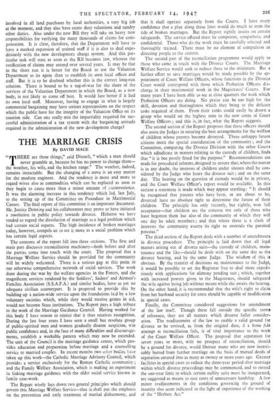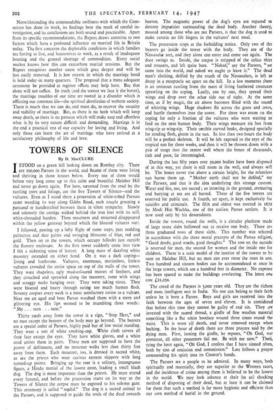THE MARRIAGE CRISIS
By DAVID MACE
The contents of the report fall into three sections. The first and main part discusses reconciliation machinery—both before and after the parties come into touch with the court. The proposal that a Marriage Welfare Service should be provided for the community will be widely welcomed. There is a serious gap at this point in our otherwise comprehensive network of social services. The work done during the- war by the welfare agencies in the Forces, and the magnificent services rendered by the Soldiers', Sailors' and Airmen's Families Association (S.S.A.F.A.) and similar bodies, have as yet no adequate civilian counterpart. It is proposed to provide this by building up a nation-wide service upon the foundations laid by a few voluntary societies which, while they would receive grants in aid, would not become State institutions. The Report pays a high tribute to the work of the Marriage Guidance Council. Having worked for this body I have reason to rejoice that it thus receives recognition. During the last four years I have seen a small but resolute group of public-spirited men and women gradually disarm suspicion, win public confidence and, in the face of many difficulties and discourage-
ments, establish a workable pattern which may now be extended. The unit of the Council is the marriage guidance centre, which pro- vides education and preparation before marriage and a counselling service to married couples. In recent months two oiler bodies have taken up this work—the Catholic Marriage Advisory Council, which provides a service exclusively for the Roman Catholic community ; and the Family Welfare Association, which is making an experiment in linking marriage guidance with the older social service known as family case-work.
The Report wisely lays down two general principles which should govern this Marriage Welfare Service—that iteshall put the emphasis on the prevention and early treatment of marital disharmony, and that it shall operate separately from the Courts. I have every confidence that a plan along these lines would do much to stem the tide of broken marriages. But the Report rightly insists on certain safeguards. The service offered must be competent, sympathetic and confidential. Those who do the work must be carefully selected and thoroughly trained. There must be no element of compulsion in directing people to the centres.
The second part of the reconciliation programme would apply to those who came in touch with the Divorce Courts. The Marriage Welfare Service would seek to reduce these to the minimum. But a further effort to save marriages would be made possible by the ap- pointment of Court Welfare Officers, whose functions in the Divorce Court would correspond with those which Probation Officers dis- charge in their matrimonial work in the Magistrates' Courts. For many years I have been able to see at close quarters the work which Probation Officers are doing. No praise can be too high for the
skill, devotion and thoroughness which they bring to the delicate tasks required of them. From their ranks could easily be drawn a group who would set the highest tone to the new corps of Court Welfare Officers ; and this is, in fact, what the Report suggests.
The second section of the Report proposes that these officers should also assist the Judges in securing the best arrangements for the welfare of children whose parents become divorced. These unhappy future citizens merit the special consideration of the community ; and the Committee, comparing the Divorce Division with the other Courts which adjudicate in matters relating to the custody of children, finds
that "it is but poorly fitted for the purpose." Recommendations are made for procedural reforms, designed to. ensure that, where the matter
is in any doubt, the interests of children under sixteen shall be con- sidered by the Judge who hears the divorce suit ; and on the same day. The hearing on the question of custody would be in private, and the Court Welfare Officer's report would be available. In this section a statement is made which may appear startling: "It should be recognised that parents who have been, or are about to be, divorced have no absolute right to determine the future of their children. The principle has only recently, but rightly, won full acceptance—that children are the concern not only of those who have begotten them but also of the community of which they will one day be adult members ; and that where there is a clash of interests the community asserts its right to overrule the parental potestas."
The third section of the Report deals with a number of amendments in divorce procedure. The principle is laid down that all legal matters arising out of divorce suits—the custody of children, main- tenance and the like—should be dealt with on the same day as the divorce hearing, and by the same Judge. The wisdom of this LI obvious. By the transfer of decisions on maintenance to the Judge, it would be possible to set the Registrar free to deal more expedi- tiously with applications for alimony pending suit ; which, together with increased powers given to the Magistrates, should safeguard the wife against being left without means while she awaits the hearing. On the other hand, it is recommended that the wife's right to claim from her husband security for costs should be capable of modification in special cases.
Finally, the Committee considered suggestions for amendment of the law itself. Though these fall outside the specific terms of reference, they are all matters which deserve fuller consider-
ation. The readjustment of the law to enable a valid ground for divorce to be revived, as from the original date, if a bona fide attempt at reconciliation fails, is of vital importance to the work
of the Court Welfare Officer. The proposal that separation for seven years or more, with no prospect of reconciliation, should be a ground for divorce, would liberate many who are now inextri- cably barred from further marriage on the basis of mutual deeds of separation entered into as many as twenty or more years ago. Greater facilities in special cases to reduce the three-year period after marriage within which divorce proceedings may be commenced, and to extend the one-year limit in which certain nullity suits must be inaugurated, are suggested as means to ease cases of unnecessary hardship. A few minor readjustments in the conditions governing the ground of insanity also seem indicated in the light of experience of the working of the "Herbert Act." Notwithstanding the commendable swiftness with which the Com- mittee has done its work, its findings bear the mark of careful in- vestigation, and its conclusions are both sound and practicable. Apart from its specific recommendations, the Report draws attention to two factors which have a profound influence on married life in Britain today. The first concerns the deplorable conditions in which families are having to live, and housewives to work, as a result of inadequate housing and the general shortage of commodities. Every social worker knows how this can exacerbate marital tensions. But the Report recognises another cause which goes deeper and will be less easily removed. It is low esteem in which the marriage bond is held today in many quarters. The proposal that a more adequate ceremony be provided at register offices may help here. But that alone will not suffice. In truth (and the sooner we face it the better), the marriage troubles of our time are rooted in a disorder which is afflicting our common life—the spiritual dereliction of western society. There is much that we can do, and must,do, to recover the security and stability of marriage. But, as there is no herb which will keep away death, so there is no panacea which will make easy and effortless what is by its very nature difficult and demanding. Marriage is in the end a practical test of our capacity for loving and living. And only those can learn the art of marriage who have arrived at a satisfactory philosophy of life and love.



































 Previous page
Previous page